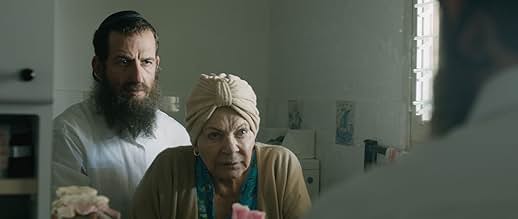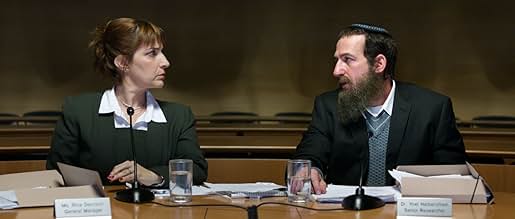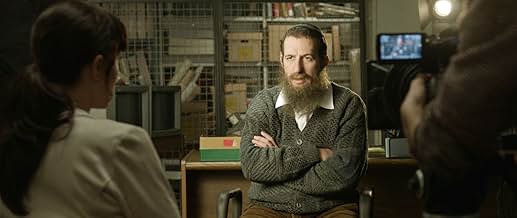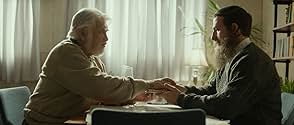Yoel, ein penibler Historiker, führt eine wichtige Debatte gegen Holocaustleugner und entdeckt, dass seine Mutter unter einer falschen Identität lebt. Ein Geheimnis rund um einen Mann, der b... Alles lesenYoel, ein penibler Historiker, führt eine wichtige Debatte gegen Holocaustleugner und entdeckt, dass seine Mutter unter einer falschen Identität lebt. Ein Geheimnis rund um einen Mann, der bereit ist, alles zu riskieren, um die Wahrheit zu erfahren.Yoel, ein penibler Historiker, führt eine wichtige Debatte gegen Holocaustleugner und entdeckt, dass seine Mutter unter einer falschen Identität lebt. Ein Geheimnis rund um einen Mann, der bereit ist, alles zu riskieren, um die Wahrheit zu erfahren.
- Auszeichnungen
- 5 Gewinne & 6 Nominierungen insgesamt
Hagit Dasberg
- Rina
- (as Hagit Dasberg Shamul)
Orna Rotenberg
- Miriam
- (as Orna Rothberg)
Miriam Gavrieli
- Shoshana
- (as Miriam Gabrieli)
Empfohlene Bewertungen
10Red-125
The Israeli film Ha'edut was shown in the U.S. with the title The Testament. The movie was written and directed by Amichai Greenberg.
Ori Pfeffer portrays Yoel, a researcher who demands the truth about a Polish massacre of Jews that took place at the end of World War II. We all know that the Germans slaughtered Jews as the war ended. However, in this case, it wasn't the Germans who carried out the massacre--it was the local Polish people.
Yoel knows this happened, and he thinks he knows exactly where it happened. It's his job to find the mass grave, and document this atrocity. However, even though a few cooperative local residents tell him that they heard the shots, and they can point out the general area, they can't give him exact instructions.
This situation is bad enough, but it's even worse because local builders want to cover the area with concrete, and then the mass grave will never be found.
Local officials offer a compromise solution. They'll admit that "several dozen" Jews were killed in the area at the end of the war. That's it. No mass grave, no further concessions. Time is running out.
This movie is an important addition to films about the Holocaust. I think that the Holocaust is in the mind of every Jew every day. Films set during this reign of terror are typically very graphic and often horrifying to watch.
The Testament is different. No one is rounding up Jews and no one is slaughtering them. The forms of politeness are maintained throughout. However, the Holocaust is there in every frame. The movie reminds us that truth about the Holocaust is worth seeking and demanding.
We saw this film on the large screen at the JCC Hart Theatre, as part of Rochester's wonderful Jewish Film Festival. It will work very well on DVD.
Yoel knows this happened, and he thinks he knows exactly where it happened. It's his job to find the mass grave, and document this atrocity. However, even though a few cooperative local residents tell him that they heard the shots, and they can point out the general area, they can't give him exact instructions.
This situation is bad enough, but it's even worse because local builders want to cover the area with concrete, and then the mass grave will never be found.
Local officials offer a compromise solution. They'll admit that "several dozen" Jews were killed in the area at the end of the war. That's it. No mass grave, no further concessions. Time is running out.
This movie is an important addition to films about the Holocaust. I think that the Holocaust is in the mind of every Jew every day. Films set during this reign of terror are typically very graphic and often horrifying to watch.
The Testament is different. No one is rounding up Jews and no one is slaughtering them. The forms of politeness are maintained throughout. However, the Holocaust is there in every frame. The movie reminds us that truth about the Holocaust is worth seeking and demanding.
We saw this film on the large screen at the JCC Hart Theatre, as part of Rochester's wonderful Jewish Film Festival. It will work very well on DVD.
Memorable and captivating cinematography. And I will add that the acting was perfect. Believable characters were rendered alive and sympathetic by performers who were sometimes subtle and sometimes intensely engaging . I know how exhausting it is to research my family genealogy and uncover the truth about family members murdered in the Holocaust. Many - including my parents - hid the truth, or refused to speak of it to their children, or were simply unable to endure the emotional pain of recalling the horrors of Nazi Germany and Eastern European pogroms. This film - focusing on just one massacre - encapsulated the frustrations of research, the poverty of memory, and the intense desire (or need) to uncover the truth. I was fortunate to see the film via my library's subscription to HOOPLA. I also recommend readers to read the other user comments for background on the events giving rise to this film. The payoff at the end was very satisfying.
10avikagan
I had the honor and pleasure to watch the premiere at the Haifa Film Festival
(First prize in the best film competition), a quality movie experience. The film deals with a complex and sensitive subject in a fascinating plot,
Uri Pfeffer in an excellent and moving game.
Go and watch it, you will not regret
Yoel Halberstam is an Israeli Holocaust researcher, a former 'haredi' (super-religious) Jew who has left the yehiva but still maintains an Orthodox lifestyle. He is the divorced father of a 12-year-old boy studying for his Bar-Mitzvah. Living a very frugal life, he is trying to uncover the details of a massacre that occurred in 1945 in Lensdorf, Austria, in which 200 Jews were massacred, and which has been covered up by everyone involved.
Lensdorf is a fictional village, based on Rechnitz, Austria, which did conduct a massacre, whose details are even more horrible than the one in the film.
Halberstam is fighting an Austrian attempt to literally cover up the killing ground. In the course of his investigations, he uncovers information that could badly affect him, his family, and his lifestyle. Will he push on?
Quiet and low-key, The Testament is riveting and very believable. The star, Ori Pfeffer, is on camera in nearly every scene, and you can't take your eyes off him. He has perfectly mastered the body language and facial expressions of the 'hardal' (nearly haredi) male.
The most chilling line is given by one of the survivors: "The war is still going on". When you see The Testament, you'll understand why.
Lensdorf is a fictional village, based on Rechnitz, Austria, which did conduct a massacre, whose details are even more horrible than the one in the film.
Halberstam is fighting an Austrian attempt to literally cover up the killing ground. In the course of his investigations, he uncovers information that could badly affect him, his family, and his lifestyle. Will he push on?
Quiet and low-key, The Testament is riveting and very believable. The star, Ori Pfeffer, is on camera in nearly every scene, and you can't take your eyes off him. He has perfectly mastered the body language and facial expressions of the 'hardal' (nearly haredi) male.
The most chilling line is given by one of the survivors: "The war is still going on". When you see The Testament, you'll understand why.
This is a good film about Jewish identity and the Holocaust but it needed more context in the script so that the plot would be better understood. The names and events were not defined clearly enough for viewers to follow along and understand the plot. Showing charts and film clips are just not enough to make it all come together in a coherent manner. Would have been superb if this level of detail was dealt with, and some of the irrelevant scenes eliminated. There is just not enough background provided to make the film totally understandable.
Wusstest du schon
- WissenswertesWhile the story itself is fiction, it was inspired by events that occurred at the end of Word War II in Rechnitz, Austria. On the night of 24-25 March 1945, some 200 Hungarian Jews were murdered near Rechnitz, by a group of local notables who had gathered for a party at the castle of the Countess of Batthyany, born Margit Thyssen-Bornemisza. The party and the killing were organized by Hans Joachim Oldenberg, her lover. At some point during the evening guns were handed out. The 200 Jewish laborers, residents of the manor, were hunted down and killed. Afterwards the guests returned to the castle to continue the party. After the war the massacre was covered up. Residents boycotted an official investigation; one witness was murdered, and other witnesses died under suspicious circumstances.
Top-Auswahl
Melde dich zum Bewerten an und greife auf die Watchlist für personalisierte Empfehlungen zu.
- How long is The Testament?Powered by Alexa
Details
Box Office
- Weltweiter Bruttoertrag
- 14.489 $
- Laufzeit1 Stunde 28 Minuten
- Farbe
Zu dieser Seite beitragen
Bearbeitung vorschlagen oder fehlenden Inhalt hinzufügen






















